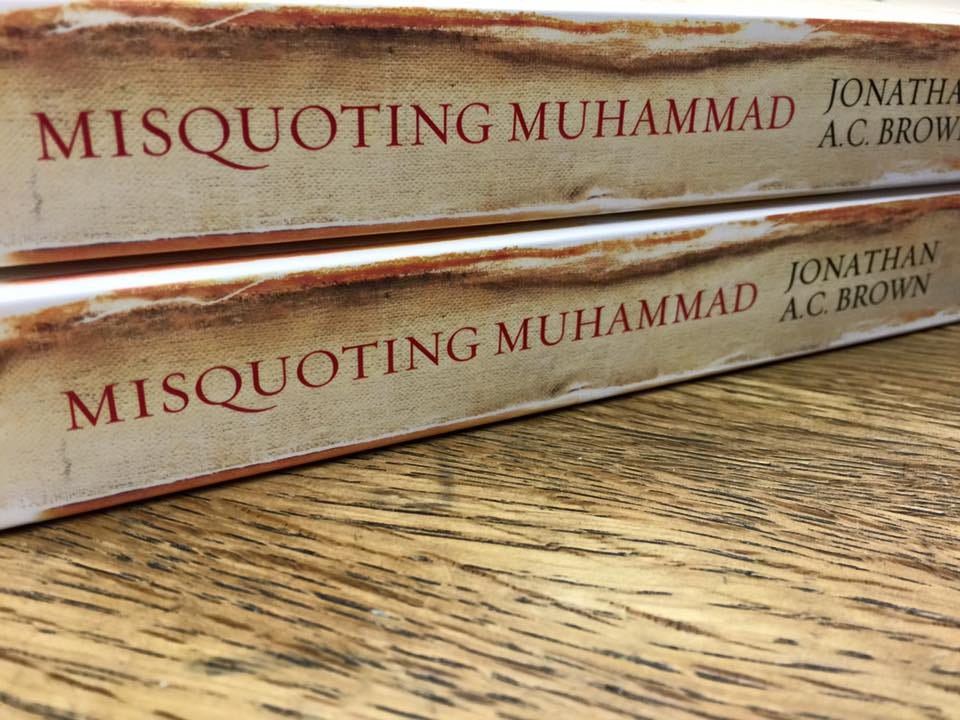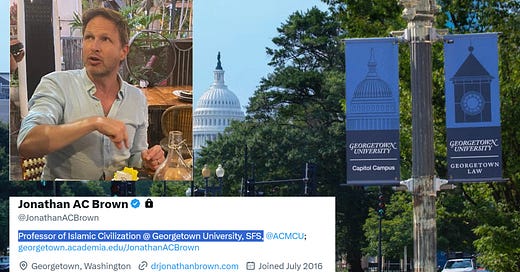Meet the Terrorist-Linked Professor Who Called for Iran to Attack American Military Bases
"I don’t think it’s morally evil to own somebody" said Georgetown Full Professor Jonathan A. Brown
A professor of Islamic Civilization at Georgetown University has been put on leave from his position today after his tweets wishing violence against American military bases went viral, according to a congressional hearing held this afternoon.
The professor — Dr. Jonathan A. Brown — explained his “hope” that Iran would launch a “symbolic strike” on the United States in a series of tweets three weeks ago.
No stranger to controversy, he also recently got into hot-water for justifying Muslim slavery, having done academic work on how Muslims are “humane” slave-owners.
“I’m not an expert, but I assume Iran could still get a bomb easily," Dr. Brown, the Alwaleed bin Talal chair of Islamic Civilization in the School of Foreign Service at Georgetown University, tweeted.
“I hope Iran does some symbolic strike on a base.”
“I’m surprised this is what these FDD/Hasbara people have been auto-erotically asphyxiating themselves for all these years,” he said.
“Ironically, the main takeaways, in my non-expert opinion, and I’m happy to be corrected, from all this have nothing to do with a US attack: 1) Iran can take a licking; 2) if Israel attacks Iranian cities, it gets f---ed up pretty bad. I mean I’ve been shocked at the damage Iranian missiles caused.”
When reached for comment, Dr. Brown claimed he "meant something like right after Soleimani was killed, with telegraphed warning and no American casualties and no one felt any further need for attacks."
"I was calling for de-esclation as I am very opposed to American involvement in foreign wars," he continued, but only after his employer reached out to him in alarm.
He also apologized a few days after his tweet blew up, claiming he did not mean for actual violence to befall the American people or Israelis.
“That’s not what I intended, I have two immediate family members in the US military that served abroad and wouldn’t want any harm to befall American soldiers,” he said.
But the powers that be were not convinced.
Georgetown University immediately released a statement condemning the incident.
“We are appalled that a faculty member would call for a ‘symbolic strike’ on a military base in a social media post.”
"We are reviewing this matter to see if further action is warranted. We take our community’s concerns seriously and condemn language which is deeply inconsistent with Georgetown University’s values."
During a congressional hearing today, the Georgetown University president confirmed that Dr. Brown had been removed from his position.
After the announcement, CAIR, The Council on American-Islamic Relations — a well-known Palestine advocacy group that has defended death threats against Zionists — decried the school’s decision.
“Universities must not allow their disciplinary processes to be hijacked by ideological pressure campaigns or online outrage mobs. Doing so undermines the integrity of the institution and chills open discourse—especially when the target is a Muslim scholar,” CAIR wrote in a press release published two hours ago.
“Instead, Georgetown should affirm its commitment to protecting academic freedom, resisting political intimidation, and standing with faculty members who have dedicated their careers to the pursuit of knowledge, justice, and dialogue.”

Dr. Brown has attracted numerous criticisms over the past years. In 2017, for example, he was forced to apologize after his comments on the morality of slavery and rape. Interestingly enough, this is also one of his research interests.
“I don’t think it’s morally evil to own somebody, because we own lots of people all around us and were owned by people, and this obsession about thinking of slavery as property,” he admitted back in 2017.
In a bibliography he published in 2019, Dr. Brown attempted to make the point that Muslims historically have treated their slaves well by compiling a list of sources (see page 115) that could be used by anyone who wants to defend Muslims slave ownership.
“A Dutch diplomat in Istanbul in the mid-1500s notes that slaves were treated well; slavery was an effective means to prevent indigency.”
“The house slaves of the Mandinke in Senegambia ‘live so well and easy, that it is sometimes a very hard matter to know the slaves from their masters or mistresses.’”
“A long-term British resident in Istanbul in the 1840s notes that manumission was frequent, slaves were rarely hit, ate the same food as their owners, and were cared for when sick.”
“Slaves, generally speaking, are more happy, better treated, and less subject to the vicissitudes of life than free servants in Turkey, and superior in these respects to the general class of menials in Europe.”
Notably, Dr. Brown is an American born convert to Islam.
He is also the son-in-law of Sami al-Arian, a Palestinian who pleaded guilty in 2006 to a terrorism charge over his support for Palestinian Islamic Jihad. Brown’s father-in-law was deported from the country in 2015 and terminated from his former employer, the University of South Florida.
The apple doesn’t usually fall too far from the tree, but this time, it was too close for Georgetown officials.
As Congress ramps up investigations into antisemitism on American college campuses — and college presidents clamor to prove to Jewish stakeholders that they’re not hotbeds of antisemitism — it’s likely we’ll see more congressional hearings on professors who call for violence in the future.
Email the author here: tonimaeairaksinen@gmail.com
Follow her on Instagram, Twitter/X, and, if you found this worthwhile, consider subscribing or dropping a tip in the jar.







"Dr. Brown attempted to make the point that Muslims historically have treated their slaves well ..."
Miguel de Cervantes (who spent five years as a slave in Algiers) winces from his grave. From "The Captive's Tale" in Don Quixote, no doubt informed by the author's ordeal:
“Although hunger and scant clothing troubled us… nothing troubled us as much as constantly hearing and seeing my master’s remarkably and exceptionally cruel treatment of Christians. Each day he hanged someone, impaled someone, cut off someone’s ears…”
When a university chooses teachers who are unworthy of respect, they degrade the value of the education they offer.